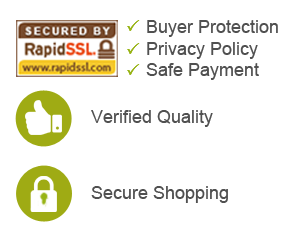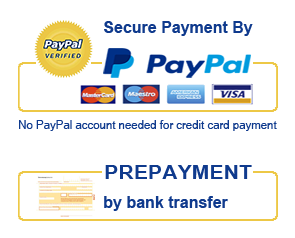General terms and conditions
As of April, 2015
§ 1 Basic provisions
(1) The general terms and conditions given below are applicable to all the contracts between Greenpicks – Eco & Upcycling Market, Annette Husmann, Storchenweg 26 in 50829 Cologne, Germany (hereinafter referred to as “the supplier”) and the customer (hereinafter also referred to as “the seller” or “the buyer”), which are concluded via the website www.greenpicks.de (hereinafter also referred to as “the platform”) of the supplier. Unless otherwise agreed upon, the inclusion of specific conditions by the customer is vetoed.
(2) A consumer, in terms of the regulations given below, is any natural entity who concludes a legal transaction for purposes which cannot predominantly be attributed either to his commercial or independent professional activities. An entrepreneur is any natural or legal entity, or a partnership having legal capacity, that is self-employed or carries out its commercial activity at the time of concluding a legal transaction.
(3) The contract language is German. The wording of the contract will not be saved with the supplier. Before the online registration is complete, the contract can be printed or saved electronically. After the supplier receives the registration, the contract data, the legally stipulated information for distance contracts and the general terms and conditions shall once again be sent via email to the customer.
§ 2 Subject matter of the contract
(1) The supplier operates a trading platform on the website www.greenpicks.de, via which registered customers can offer or purchase products and/or services.
(2) The supplier provides only the technical aspects of this platform for use by the customers so that they can offer or purchase their products or services. The supplier shall explicitly not be a contracting party in the agreements reached between the customers. Only the customers involved are responsible for fulfilling the obligations resulting from these agreements. The formation of these contracts depends on these GTC (general terms and conditions), if applicable, supplemented by the GTC of the customers.
(3) The offers published by the sellers on the supplier’s platform shall not be checked by the supplier. The respective seller shall be solely responsible for their correctness, completeness and legality. The supplier shall particularly have no influence on the truth and correctness of the offers or on the quality of the services offered.
§ 3 Registration
(1) Customers must register in order to use the supplier’s platform.
(2) Registering a customer as a buyer
a) The supplier’s offer to register a customer as a buyer represents a binding offer to conclude a user contract with the supplier.
b) The customer can accept the supplier’s offer as binding by using the online registration form. For this, the customer needs to provide personal data, a username and a password. The customer has the option to modify what he has entered or cancel the registration throughout the entire registration process. After confirming his registration using the “Register” button, the customer shall receive an auto-generated email requesting him to verify his email address. During the registration, a buyer account shall be set up using the email address and password specified by the customer
(3) Registering a customer as a seller
a) The supplier’s offer to register a customer as a seller is solely aimed at natural or legal entities or partnerships having legal capacity, insofar as the legal transaction is concluded while carrying out the commercial activity or being self-employed (entrepreneur) and insofar as they are not end-users or are not using the offers of the supplier as end-users while carrying out their independent professional, commercial or official or business activity. Entry into a contract with consumers is explicitly ruled out.
b) The supplier’s offer to register a customer as a seller is non-binding and does not represent any binding offer to conclude a user contract with the supplier.
c) The customer can make a binding offer to conclude a user contract with the supplier using the “Become a vendor” button. For this, the customer must provide his business and personal data in the online registration form and also select a password to register with. The customer has the option to modify what he has entered or cancel the registration throughout the entire registration process. By sending the registration request using the “Register with payment liability" button, the customer makes a binding offer to the supplier.
The customer shall initially receive an auto-generated email about the receipt of his registration request, which still does not result in the contract being concluded.
d) The offer shall be accepted (thus concluding the contract) within 5 days with a confirmation in writing (e.g. email) to the customer (order confirmation). If the customer has not received such notification within this period, he is no longer bound to the registration request. If necessary, services that have already been provided shall be immediately reimbursed in this case. (4) In response to enquiries, which are conveyed to the supplier in writing, by telephone, via fax or email, the customer shall receive all the contract data as well as the legally stipulated information for contracts in e-commerce and the general terms and conditions. If the offer is sent electronically (e.g. email), the customer can print it and/or save it electronically. The customer has 5 days to accept the supplier’s offer.
(5) The customer’s registration is processed and all the information required in connection with the conclusion of the contract is sent via email, in some cases automated email. Therefore, the customer must ensure that the email address provided to the supplier is correct, and that he is able to receive emails despite the SPAM filter.
§ 4 Conclusion of a contract between the buyer and seller
(1) The offers in the respective online shop for the purchase of products or use of services are non-binding and do not obligate to enter into a contract.
(2) The buyer can make a binding offer of purchase (order) using the online shop system.
The products or services planned for purchase shall thereby be saved in the “shopping cart”. The customer can bring up the “shopping cart” using the corresponding button in the navigation bar and make changes to it at any time. After the customer brings up the “Checkout” page and enters his personal details and the payment and shipping conditions, all the order data shall be displayed one more time on the order overview page. Before dispatching the order, the buyer may reconfirm or modify his details, or cancel the purchase. The buyer makes a binding offer to the seller by sending the order using the “Order with payment liability” button.
The buyer shall initially receive an auto-generated email about the receipt of his order, which still does not result in the conclusion of the contract.
(3) The offer shall be accepted (thus concluding the contract) within 3 days with a confirmation in writing (e.g. email) to the customer (order confirmation). If the buyer has not received such notification within this period, he is no longer bound to the order. If necessary, services that have already been provided shall be immediately reimbursed in this case.
(4) Enquiries by the buyer, which are conveyed to the seller in writing, by telephone, or via fax or email, are non-binding upon the buyer. If a binding offer is made, the buyer shall receive all the contract data, the legally stipulated information for contracts in e-commerce and the general terms and conditions. If the offer is sent electronically (e.g. via email), the buyer can print it and/or save it electronically. The customer has 5 days to accept the seller’s offer.
§ 5 Costs and payment terms for the seller
(1) The prices indicated on the supplier’s website are sum prices. They include all the price components and are inclusive of all taxes.
(2) The customer has the following payment options:
- Payment via SEPA – debit note
- Payment via advance payment (bank transfer) if explicitly agreed with the supplier.
(3) Unless otherwise agreed upon, the payment is due immediately and must be paid in advance.
(4) SEPA debit note When paying via the SEPA debit note, the customer shall authorise the supplier to collect the invoice amount from the specified account by issuing a corresponding SEPA mandate. The supplier shall provide the customer with the forms for issuing the SEPA mandate on its website, or via email at the latest immediately after conclusion of the contract. The debit note shall be collected, after the conclusion of the contract, on the 15th of every month. If the due date falls on a holiday or a weekend, it is postponed to the next working day.
The customer is under an obligation to ensure sufficient cover in the account for the due date. If a debit note is returned owing to a fault of the customer, the customer incurs the bank charges. The supplier reserves the right to exclude, in isolated cases, payment by SEPA debit note.
(5) If the customer falls behind in the payment of a significant amount of the agreed compensation despite being requested to pay, the supplier is authorised,
a) to block access to the platform temporarily and/or
b) terminate the contract without adhering to a notice period.
§ 6 Rules for using the platform
(1) Use of the supplier’s platform is regulated on the basis of the Greenpicks principles in addition to these general terms and conditions. The following Greenpicks principles are of special importance:
- Market guidelines
- Principle for the rating system
- Principles for buyers and sellers
(2) The customer is under an obligation to provide true information during the registration.
(3) Customers must take all measures necessary to secure their data. The customer is responsible for protecting his user account from being misused. He must safeguard the login data from being accessed by third parties. As soon as the customer finds out that third parties have unauthorised access to his login data or have gained unauthorised access to the platform, he is under an obligation to immediately inform the supplier.
(4) The platform users should maintain peaceful and respectful relations, without resorting to offensive hostilities.
(5) The customer is solely responsible for the contents uploaded by him.
(6) The customer is under an obligation,
- not to upload any content or data which violates good practices or the applicable German laws; obscenities, vulgarities, insults, defamation and circulation of extreme political views are especially not permitted.
- not to publish any content or data which violates the rights of third parties (especially copyrights, rights to a name, trademark rights) or violates any existing laws.
- not to send unwanted and persistent emails to other platform users (spam).
- not to advertise without the explicit written approval of the supplier.
The customer shall explicitly release the supplier from all the claims of third parties that are given in this context. This also concerns the costs of legal representation required in this regard, including all legal fees.
(7) The contents and contributions published by the customer are not checked by the supplier with respect to their content. Customers’ content and contributions are published automatically on the website.
(8) If any of the rules mentioned above are violated, the supplier can take the following measures at its own discretion:
- issuance of a warning and/or
- deletion or modification of content uploaded by the customer and/or
- restrictions to the functionality of the respective customer account or
- termination of the user contract
§ 7 Platform accessibility/maintenance work
(1) The supplier shall ensure 98% accessibility to its platform annually, on average. This excludes occasions when the server is not accessible because of technical or other problems which are beyond the sphere of influence of the supplier (force majeure, fault of third parties, etc.).
(2) The supplier is authorised to expand the functionality of the platform and its structure at any time, make technical adaptations, modify menu navigation or layouts, and carry out other maintenance work. For this, access to the platform can be interrupted for a maximum duration of 24 hours. The supplier shall inform the customer of planned changes three days in advance, at the latest.
§ 8 Assumption of contract by a third party
The supplier is authorised to transfer his rights and duties from this contractual relationship, wholly or in part, to a third party, with a notice period of four weeks. In this case, the customer is authorised to terminate the user contract after receiving notification of the assumption of contract without adhering to a notice period.
§ 9 Contract duration / termination
(1) The user contract between the supplier and the customer starts with the formation of the contract in accordance with § 3 of these provisions and is concluded for an indefinite period.
(2) The supplier and the customer who is registered as a seller can properly terminate the user contract with a notice of 14 days before the end of the month in each case.
(3) The customer who is registered as a buyer can properly terminate the user contract with the supplier at all times, without adhering to a notice period.
(4) The right to termination without notice for an important reason remains unaffected with respect to the above condition. An important reason exists for the supplier especially
- if the supplier is legally called on because of negligent conduct on the part of the customer and/or
- if the rating system (e.g. intentionally incorrect information, irrelevant remarks, repeated negative information which is clearly unjustified) is misused and/or
- if the seller or buyer repeatedly violates his contractual obligations or does not stop violating the obligations even after being requested by the supplier; and/or
- in case of inability to pay or excessive indebtedness on the part of the customer; and/or
- in case of the closing or suspension of the seller’s business activity; and/or
- if insolvency, settlement or comparable proceedings are applied for or opened with respect to the assets of the customer registered as a seller.
(5) The termination must be in text format.
(6) If the supplier has terminated the contract with the customer, the customer has no claim to the setting up of a new user account, either under any other name or any other designation.
§ 10 Warranty
(1) For the proportion of services provided by the supplier that are subject to the statutory materials defect liability and warranty of title, the supplier guarantees that the service has the quality features that have been explicitly agreed on and that no rights of third parties conflict with their use.
(2) The liability of the landlord regardless of negligence or fault for material defects at the time of concluding the rental agreement is excluded. § 536 a Para. 1 of BGB (German Civil Code) is not applicable in this respect. As for the rest, the statutory regulations are applicable.
(3) The customer is under an obligation to inspect the service immediately and with due diligence with respect to quality deviations as well as other evident defects. In case of evident defects in the services provided by the supplier, the customer shall notify them to the supplier in writing at the latest within 14 days of usage. Sending the notice of defects on time is sufficient to meet the deadline.
The aforementioned regulation is also applicable to hidden defects that are ascertained subsequently. If the duty to examine or notify a defect is violated, the assertion of the warranty claims is excluded.
(4) In case of any observed and/or notified defects in the service provided, the supplier shall provide a guarantee through a supplementary performance. If the supplementary performance fails twice, the customer can request either a reduction in the compensation (abatement) or a cancellation of the contract (withdrawal).
The customer is not entitled to the right to withdrawal following a negligible violation of an obligation.
(5) The warranty period is one year. The reduced warranty period is not applicable to: damages resulting from injury to life, body or health culpably caused by the supplier and grossly negligent or intentionally caused damages, or in the case of malicious intent of the supplier, or in the case of rights of recourse in accordance with §§ 478, 479 of BGB.
§ 11 Liability limitation
(1) The supplier is liable without restrictions in each case for damages from injury to life, body or health, in all cases of intent and gross negligence, in case of fraudulent concealment of a defect and in all other statutorily regulated cases.
(2) If important contractual obligations are affected, the liability of the supplier in case of slight negligence is limited to the foreseeable damages typical for this type of contract. Important contractual obligations are obligations which result from the nature of the contract and whose violation would jeopardise the fulfilments of the contract, as well as obligations which the contract imposes on the supplier according to the contents of the contract for achieving its purpose; the fulfilment of these obligations allows the proper execution of the contract, and furthermore, the customer can rely on the fact that they will be complied with at all times.
(3) Insofar as the liability for damages is excluded or limited as against the supplier, this is also applicable to the personal compensation liability of the employees, workers, representatives and other assistants of the supplier.
(4) If insignificant contractual obligations are violated, the liability in case of slightly negligent violations of obligations is excluded.
(5) In accordance with the current technological developments, online communication cannot be guaranteed to be error-free and/or usable at all times. In this respect, the supplier is liable for neither irregular nor interrupted availability of the website and the service offered thereon.
§ 12 Choice of law, place of performance, place of jurisdiction
(1) German law is applicable. In the case of consumers, this choice of law is applicable only if this does not affect the protection offered by the mandatory provisions of the law in the state in which the consumer has his usual residence (benefit-of-the-doubt principle).
(2) The place of performance for all the services from the business relationships with the supplier as well as the place of jurisdiction is the registered office of the supplier insofar as the customer is not a user, but a businessman, a legal entity of the public law or a special fund under public law. The same is applicable if the customer does not have a general place of jurisdiction in Germany or the EU, or his domicile or usual place of residence is not known at the time of the commencement of a suit. The authority to also take legal action at another legal place of jurisdiction remains unaffected with respect to the above.
(3) The regulations of the UN Convention on Contracts for the International Sale of Goods are explicitly not applicable.














